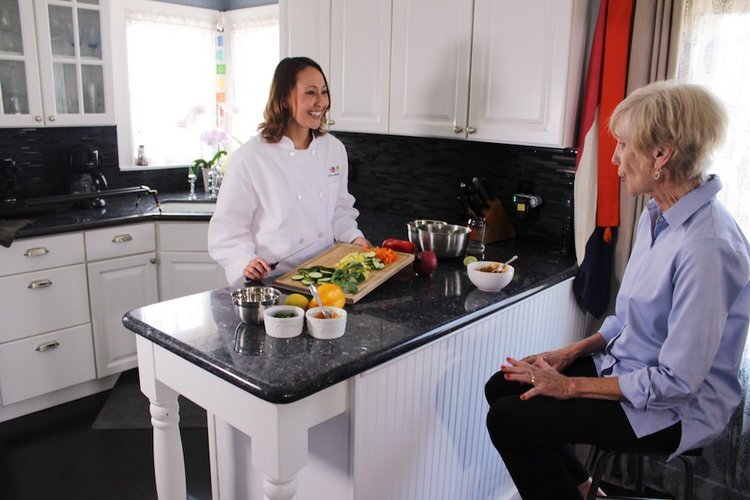7 Tips For Starting A Personal Chef Business
So, you’re a chef who’s tired of the long hours and harsh work environment of restaurants. Or maybe you’re a foodie who enjoys cooking at home and would love to translate that passion into a business. In either case, starting a personal chef business could be an ideal business venture for you. You’ll get to live out your dream of making amazing food in a relaxed work environment, build lasting relationships with people, and make a great living at the same time.
In this article, we’ll define what a personal chef does, explain some of the benefits of becoming a personal chef, and offer 7 Tips For Starting A Personal Chef Business.
If you’re interested in being a personal chef, but feel you would benefit from additional marketing and operational support, click below to view more information on Chefs For Seniors’ Franchise Opportunity.
WHAT DOES A PERSONAL CHEF DO?
The personal chef business model is admittedly new and innovative; in fact for all you accountants the personal chef industry doesn’t even have it’s own NAICS industry code. Simply put, a Personal Chef Service provides clients with customized, nutritious, delicious, and affordable meals prepared in the comfort of their own home. As a personal chef, you work with an individual client or family who hires you to visit their home 2x/week, weekly, bi-weekly, or monthly to prepare make-ahead meals. A big part of a personal chef service is building relationships with your clients, and having a solid understanding of their dietary concerns and specific food preferences.
Most personal chefs charge a fixed rate for their services, with the grocery cost being reimbursed by the client. And different than a private chef service, where you contract with just one family and are in their home almost every day, personal chefs cook for multiple clients in a week – typically 5 to 15.
In addition to a make-ahead meal service, most personal chefs will also do dinner parties and small catering events where they prepare the food at the client’s home.
So that’s what a personal chef DOES do, here’s what most DON’T do:
- Meal delivery: most personal chef companies don’t have access to a commercial kitchen, so they’re unable to prepare meals offsite and deliver them. In order to offer meal delivery, you’d need to be properly licensed too.
- Other household chores: a personal chef’s craft and passion is food, so they probably aren’t the best fit for helping clients with landscaping, housecleaning, and other home services. Plus, most liability insurance carried by personal chefs only covers them while they’re cooking, shopping, and driving.
Personal chefs prepare customized meals for the week in their clients homes, and also handle grocery shopping.
BENEFITS OF STARTING A PERSONAL CHEF BUSINESS
There are many reasons why a personal chef business is an attractive venture, including:
- Low capital investment: compared to other businesses in the foodservice industry, a personal chef business requires a very low initial investment and minimal ongoing expenses. That means it’ll be easier to get to profitability, and the business is lower risk than other ventures because you shouldn’t need to take out a business loan. Since you’re doing the cooking in the client’s home and purchasing food at a grocery store, you don’t need commercial space, equipment (aside from pots, pans, utensils, etc.), or inventory. In terms of all your startup expenses for the first 3 months, it’s very realistic to start a small personal chef business for $5-$15K.
- Work-life balance: as a personal chef, when you work is dependent on the client’s availability and your availability. Generally, no one is going to want their chef cooking in their home at midnight, so you avoid the late nights that plague restaurant workers. Plus, when you’re not cooking or marketing you can run the business from home so you can spend more time with your family.
- Relationship with clients: personal chefs really enjoy the lasting friendships they build with clients, especially those serviced on a long-term basis.
- Creative expression: as a personal chef, you’re encouraged to utilize your creativity and make a wide variety of dishes for clients. There’s really no better way to familiarize yourself with cuisines from all over the world than being a personal chef.
- Earning potential: simply put, if you play your cards right you can make more money as a personal chef than you could in other food service jobs. Many personal chefs charge a fixed rate for their services, but if you break it down to an hourly rate many are bringing in $40-$100/hour when executing the service. A personal chef with a full slate of clients can make upwards of $150K per year, plus there’s always the option to hire additional chefs and expand your reach.
One of the benefits of being a personal chef is building lasting relationships with your clients.
7 TIPS FOR STARTING A PERSONAL CHEF BUSINESS
If you’re looking to start a personal chef business, here are 7 tips to get you on the right track:
- Form an LLC: instead of going the sole proprietor route, personal chefs should form an official business entity and submit articles of organization to the state for a Limited Liability Company. Because you’re preparing food, there’s always the potential for clients to sue your business, and an LLC provides you an added layer of protection for your personal assets. Plus, you avoid the double taxation and other complexities of a c-corporation.
- Get properly insured: before you start servicing clients, make sure you have general liability insurance through a reliable carrier. Some insurance carriers won’t cover in-home services, and you’ll receive various premium quotes from different companies, so it’s best to shop around. You may want to also consider property damage and/or professional liability insurance. If you hire employees, you’ll need worker’s compensation insurance.
- Write a business plan: it’s one thing to have an idea in your head for how you’re going to build a personal chef business, it’s another to actually execute the plan. Writing a solid business plan will help organize your thoughts on paper, establish a financial plan, and attract investors if you’re seeking outside capital.
- Purchase your website domain & build a nice website: once you decide on a company name, make sure you purchase the web domain name through a company like GoDaddy or Google Domains. You may want to purchase multiple domain endings in addition to .com, such as .co, .net, .org, and .io. This ensures no one else can purchase that domain name. Once you have the domain, you’ll want to build a nice looking website. One of the challenges of starting a new business in this day and age is the cost (a custom website can easily cost over $10K) of building an SEO optimized website that will drive significant traffic. Simply put, a new website isn’t going to attract a lot of visitors short of you having a massive email list or amazing press. Unfortunately, Google’s algorithms don’t work very quickly. One shortcut to getting lots of website traffic initially is to buy into a personal chef franchise with an established brand and website domain.
- Have a solid marketing plan: with any service business, once you’re officially “open” the reality is your phone isn’t going to start ringing right away. You’ll need a solid marketing strategy utilizing different channels, including referral marketing, direct sales, and online advertising (through Facebook, Google Adwords, and email marketing). You also have to be patient, as they say, “Rome wasn’t built in a day.” Even if you’re diligent about marketing efforts, it will probably take 3-6 months to fill up your schedule with clients. If marketing and sales aren’t your forte, you can always hire a marketing agency or inquire about franchising/licensing opportunities with various companies that providing marketing support for personal chefs.
- Perfect your recipes: before cooking for paying clients, practice the service as much as possible with friends and family. Perfect the recipes you’re going to add to your menus, but leave enough flexibility to allow for client customization. Focus on your strengths, if you’re not familiar with making Thai food it’s probably best to leave those dishes off your menu.
- Gather testimonials ASAP: people buy services from trustworthy businesses, so testimonials on your website and social media pages are extremely important. As soon as you start servicing clients, be sure to gather written and video testimonials and upload them online.
If you’re interested in exploring a personal chef business venture further, but feel you could benefit from additional support for:
- Digital marketing
- Content marketing
- Print advertising
- Technology solutions
- Operations training
- Recipes
- Business coaching
- Community support
Click below to learn more about affordable personal chef franchise opportunities through Chefs For Seniors.





